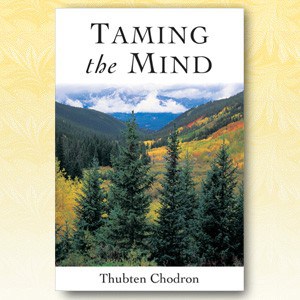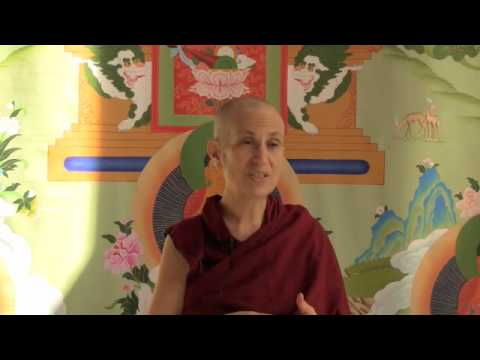Six root afflictions: Ignorance and wrong views
Stages of the Path #100: The Second Noble Truth
Part of a series of Bodhisattva's Breakfast Corner talks on the Stages of the Path (or Lamrim) as described in the Guru Puja text by Panchen Lama I Lobsang Chokyi Gyaltsen.
Yesterday we were talking about the two different kinds of ignorance. The first was ignorance of conventionalities, meaning both cause and effect and karma and its effects. That kind of ignorance—in the ten nonvirtues—is very related to the last one of wrong views.
Because one of the wrong views we have is that there’s no ethical dimension to our actions. We believe we can do this or that and it’s not going to bring any result in a future life because there are no future lives. This way of thinking is a wrong view. His Holiness has said that in terms of those wrong views one doesn’t have to actually have the conscious thought “I don’t believe in future lives and my actions don’t have an ethical dimension.” Rather, just having the idea that what I do doesn’t matter or that my actions don’t have results is a wrong view.
Our actions matter
I was thinking about that in a more general way. I’m not saying that all of the following things belong to that specific wrong view, but I’m just spreading that out more. Well, what does it mean to think our actions don’t matter or that whatever we do doesn’t have a result? I was thinking that it feeds very much into this attitude we have of thinking, “This is my life. What I do is my business. It only affects me. It doesn’t affect anybody else, so leave me alone.”
I often think here of the debate about whether people should wear motorcycle helmets or not. Should people be required by law to wear helmets when they’re on the highway on a motorcycle? All the bikers are saying, “No, it’s my life. If I want to kill myself it’s okay.”
I look at that argument, and it is true; however, what you do impacts me. If I happen to be on the highway, and there’s an accident—maybe I was at fault—and you’re involved in it and you die, I’m going to feel horrible. But if you would have lived because you had worn a helmet I wouldn’t feel as horrible as I would have felt by causing an accident in which somebody died. Thinking, “It’s my life. What I do doesn’t matter; it doesn’t affect you,” doesn’t work in this situation. For me that’s a pretty shocking example. So, I was very glad when they passed the helmet law because what we do does impact other people.
But so often we just have this feeling that we’re independent entities and it doesn’t matter. I’m not saying that we have to always try and please other people. And I’m not saying we’re responsible for their feelings. What I am saying is to take a big picture view and see that our actions do affect others in many, many, many ways—big ways and small ways. And our actions also affect ourselves. They plant the seeds in our mindstream for what we ourselves are going to experience.
Using mindfulness wisely
Being mindful and aware that we are an interdependent phenomena that influences others, that our thoughts and actions impact our own and others’ futures, makes a big difference in how we relate to everybody. And when that mindfulness is really strong, it makes us very aware of how others’ actions influence us. Here particularly, rather than looking at how others’ reckless or heedless actions influence us, let’s try to look at how others’ kind actions influence us.
When we’re looking at our own actions, we need to look at how our reckless, heedless actions influence others. But when looking at others’ actions, we need to focus on how their kind actions influence us. We usually do the opposite, and that’s why we’re miserable and in conflict. If we do it this way then we’ll be a lot more peaceful and get along better with others.
Venerable Thubten Chodron
Venerable Chodron emphasizes the practical application of Buddha’s teachings in our daily lives and is especially skilled at explaining them in ways easily understood and practiced by Westerners. She is well known for her warm, humorous, and lucid teachings. She was ordained as a Buddhist nun in 1977 by Kyabje Ling Rinpoche in Dharamsala, India, and in 1986 she received bhikshuni (full) ordination in Taiwan. Read her full bio.


